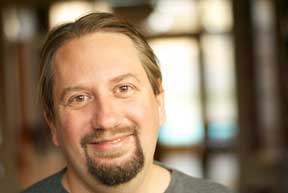Huber selected as new director of Purdue Climate Change Research Center
January 24, 2013
 |
|
Matthew
Huber |
WEST LAFAYETTE, Ind. - A leading Purdue University researcher in tropical cyclones and global warming has been named director of the Purdue Climate Change Research Center, the university's interdisciplinary effort focusing on research and education in global climate change.
Matthew Huber, a professor of earth, atmospheric and planetary sciences who has been at Purdue since 2003, will succeed Otto Doering, who has served as interim director of the Discovery Park center since October 2010. Huber's appointment is effective immediately.
"Professor Huber is internationally known by the climate change community for his research, particularly on the issues of tropical cyclones and global warming," said Alan H. Rebar, director of Discovery Park and Purdue's senior associate vice president of research. "As a co-founder of the Purdue Climate Change Research Center, we believe Matt will be a great fit for what we hope to accomplish through the center and its role within Purdue's Global Sustainability Institute."
In leading the Climate Dynamics Research Laboratory at Purdue, Huber has focused his research on past climate change; future heat waves; mechanisms that govern climate; different forms that climates can take on Earth; and the relationship between climate change and life.
"The basic problem posed by climate change is well-defined, and the science of climate change is mature," said Huber, who has had more than 50 research papers published since joining the Purdue faculty a decade ago.
"From policymakers, economists and farmers to insurance companies and city planners, the goal for the Purdue Climate Change Research Center now is to reach out to potential stakeholders to inquire what kind of information and research they need, to develop a signature area at Purdue for helping people, and presenting information that offers solutions to the climate change problem."
Huber's research on tropical cyclones and global warming ranked No. 37 in the top 100 list of scientific stories in 2007 by Discover Magazine, and his work on Cretaceous-Tertiary impact was highlighted as one of the 100 top scientific discoveries in 2004 by Discover Magazine.
He received his bachelor's degree in geophysics from the University of Chicago, a master's degree in atmospheric sciences from the University of California Los Angeles, and a doctorate in earth sciences from the University of California Santa Cruz. He also served as an assistant research professor for the Niels Bohr Institute at the University of Copenhagen.
Fifty-four Purdue faculty members and research staff are collaborating in the Purdue Climate Change Research Center, which was established in 2004 to support and promote research and education on global climate change and to examine its impact on agriculture, natural ecosystems and society. The center has generated more than $20 million in research funding since its inception.
Discovery Park launched the Global Sustainability Institute (GSI) to coordinate Purdue's research efforts in sustainability challenges such as climate change, energy, food security, the environment and water. In addition to the Purdue Climate Change Research Center, GSI includes the Center for the Environment, Energy Center, Purdue Water Community and the Purdue Center for Global Food Security.
Discovery Park is a $750 million complex at the heart of large-scale interdisciplinary research and innovation at Purdue, building on the university's strengths in science, technology, engineering and mathematics.
Writer: Phillip Fiorini, 765-496-3133, pfiorini@purdue.edu
Sources: Alan H. Rebar, 765-496-6625, rebar@purdue.edu
Matthew Huber, 765-494-0044, huberm@purdue.edu
